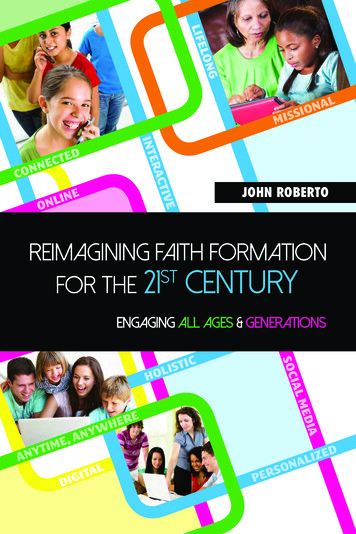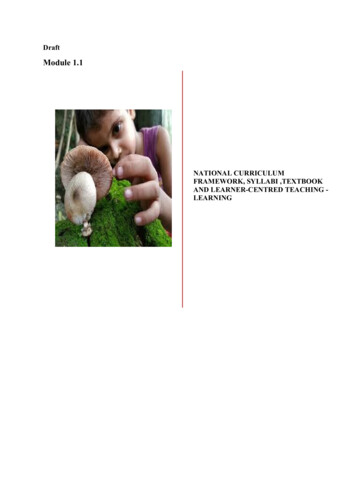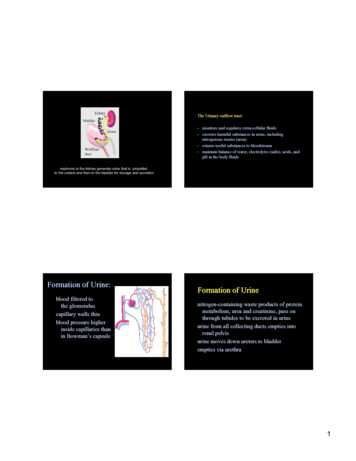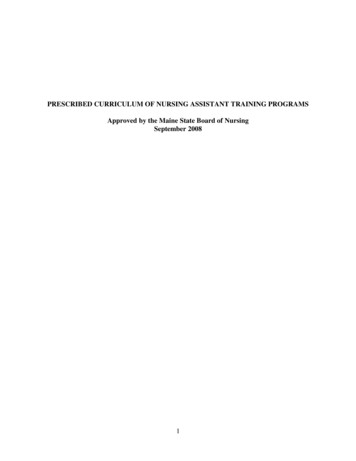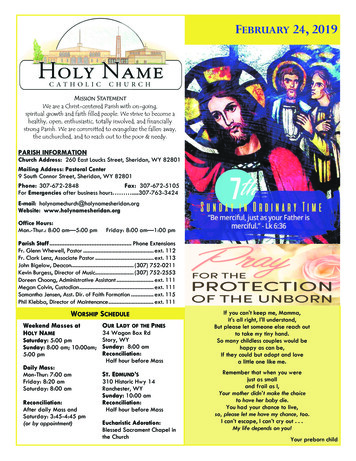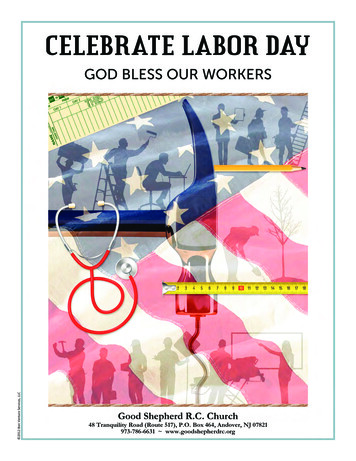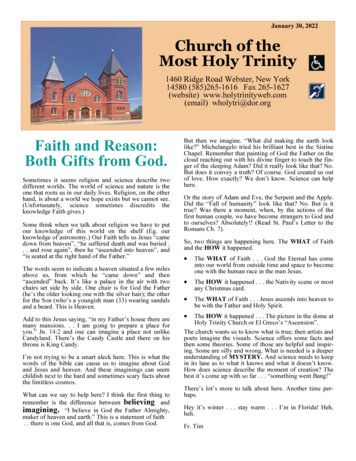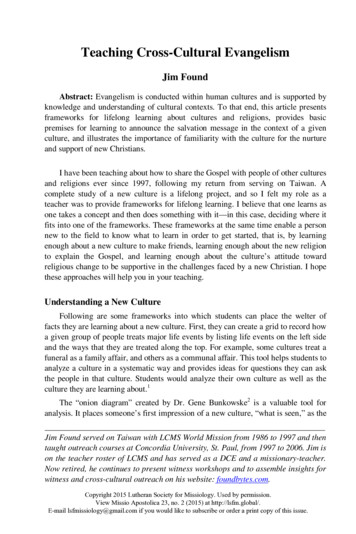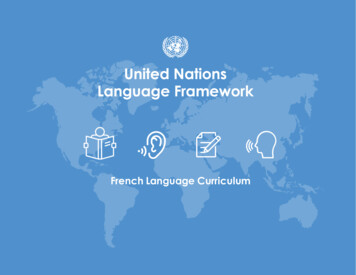![Faith Formation [Religion] Curriculum Framework](/img/32/religion.jpg)
Transcription
FAITH FORMATION [RELIGION] CURRICULUMFRAMEWORKGRADES PRE-K THROUGH 8TH GRADE“Christ the Teacher” by Brother Michael McGrathDIOCESE OF ORLANDO 2009, Diocesan Offices of Catholic Schools and Religious Education
Bishop of OrlandoFebruary 23, 2009Dear Friends in Christ,I am pleased to present to you the Faith Formation [Religion] Curriculum Framework for PreKindergarten through eighth grade for the Diocese of Orlando. The Curriculum Framework is foruse in both Catholic Schools and Parish Religious Education Programs thus creating a spirit ofharmony and unity in handing on the faith to the children throughout our diocese.As the chief catechist of the diocese, I, as your bishop, have the responsibility to ensure that therichness of the content of the Catholic faith is handed on in such a way that all are motivated tocelebrate, live, and proclaim it coherently in their daily lives.The General Directory for Catechesis [GDC] explains that “comprehensive formation includesmore than instruction: it is an apprenticeship of the entire Christian life” [GDC, 67]. Thus, thosewho teach in our Catholic Schools and Parish Religious Education Programs must be committedto ongoing formation in their own lives so that they are able “to transmit not only a teaching butalso an integral Christian formation, by developing tasks of initiation, of education, and ofteaching. [They] must be able to be, at one and the same time, teachers, educators and witnessesof the faith” [GDC, 237].This Curriculum Framework is a joint effort of the diocesan offices of Catholic Schools andReligious Education. I am grateful to them and all those who generously served on theircommittee for their thoughtful work. They have given the diocese a productive instrument tohelp us move forward with a systematic curriculum drawn from the Catechism of the CatholicChurch.I ask that you begin to integrate this document into your local faith formation programs for PreKindergarten through Eighth Grade beginning with the 2009 – 2010 school year.Thank you for handing on the Faith with our young people.Sincerely yours in Christ,Most Reverend Thomas G. WenskiBishop of Orlando
February 23, 2009Dear Catechists,We are very excited about the new Faith Formation (Religion) Curriculum Framework for pre-schoolthrough eighth grade for both our religious education programs and our elementary schools in the Dioceseof Orlando. This curriculum is the product of a long process of development that incorporates the visionof catechesis as set forth in the General Directory for Catechesis and the National Directory forCatechesis, as well as the content for catechesis as set forth by the bishops in the Doctrinal Elements forElementary Grades Based on the Catechism of the Catholic Church, and the Protocol for Assessing theConformity of Catechetical Materials with the Catechism of the Catholic Church.We wish to thank Sr. Linda Gaupin, CDP, Senior Director of Religious Education, and Mr. JamesCooney, Associate Superintendent of Schools, as well as the entire Religion Curriculum SteeringCommittee for their leadership and dedication in the writing of this Framework. We are confident that itwill provide the needed guidance for our catechists as they instruct our young people in our faith, bringingChrist’s light into their lives.The Faith Formation (Religion) Curriculum Framework will also help shape the staff developmentprograms for our catechists in parish programs and in schools. The success of how well we implementthis new religion curriculum depends heavily on our developing and conducting excellent staffdevelopment programs based on the Framework and on the participation of our catechists in theseprograms. We encourage each catechist to take advantage of every opportunity to become totally familiarwith the curriculum and to use it as the basis of their instruction. In addition, we hope that those whoteach secular subjects in our schools see it as a way to integrate issues of faith into the content of theirsubject area.Thank you for all that you do to advance the educational mission of the Church. Your efforts are greatlyappreciated.Sincerely yours,Nicholas M. Wolsonovich, Ph.DSecretary of Faith Formation/Superintendent of Schools50 E. Robinson Street, Orlando, FL 32801 P.O. Box 1800, Orlando, FL 32802-1800Phone: 407-246-4900 Fax: 407-246-4940 www.doschool.org
IntroductionFaith Formation [Religion] Curriculum Framework for Pre-K – Eighth Grade“Within the Church’s mission of evangelization, catechesis promotes and matures initialconversion, educates persons in the faith, and incorporates them into the life of the Christiancommunity.”[National Directory for Catechesis, p. 57]The Faith Formation [Religion] Curriculum Framework for the Diocese of Orlando is theproduct of a collaborative effort between the Diocesan Offices of Catholic Schools and ReligiousEducation. The curriculum is a result of many hours of hard work and dedication by a committeecomposed of parish Directors of Religious Education, Catholic School Principals, catechists,teachers, and diocesan staff.The religion curriculum is designed to promote life long faith formation. This particularcurriculum is for use in both Catholic Schools and Parish Religious Education Programs forchildren from Pre-K to eighth grade. The curriculum is based on a spiral approach to learning,that is the same fundamental faith topics are presented each year so that the student maygradually deepen his/her understanding of the faith according to his/her age and ability.The curriculum is structured according to the six fundamental tasks of catechesis set forth in theGeneral Directory for Catechesis [GDC, #85-86] and the National Directory for Catechesis[NDC, pp. 60 – 63]. The NDC explains that “Catechesis comprises six fundamental tasks”1.2.3.4.5.6.Catechesis promotes knowledge of the faith [Creed].Catechesis promotes knowledge of the meaning of Liturgy and the sacraments[Worship and Prayer].Catechesis promotes moral formation in Jesus Christ [Moral Life].Catechesis teaches the Christian how to pray with Christ [Worship and Prayer].Catechesis prepares the Christian to live in community and to participate actively inthe life and mission of the Church [Community Life].Catechesis promotes a missionary spirit that prepares the faithful to be present asChristians in society [Apostolic Life].In this curriculum there are five major strands for each grade. The strands represent a majorcategory of religious knowledge. Creed Worship and Prayer Moral Life Community Life Apostolic LifeUnder each strand are standards. The standards are general statements of expected learnerachievement. They describe general expectations regarding knowledge within a specific strand.Page 1
The benchmarks are statements of expectations about student knowledge that a students shouldknow at the end of each developmental level. Benchmarks translate standards into specificexpectations at each level of student development.This curriculum brings together the teaching of the Church regarding catechetical content as setforth in the following documents: Doctrinal Elements for Elementary Grades Based on the Catechism of the CatholicChurch Protocol for Assessing the Conformity of Catechetical Materials with the Catechism ofthe Catholic Church Catechism of the Catholic Church General Directory for Catechesis National Directory for CatechesisCurriculum and the Ministry of CatechesisThe goal of the Faith Formation [Religion] Curriculum of the Diocese of Orlando is to enable thestudent to gradually know and understand the “content of God’s self-revelation, which is foundin Sacred Scripture and Sacred Tradition” according to their age and ability [NDC, p. 60].Religious instruction, however, must be understood within the total context of the ministry ofcatechesis. “Catechesis does not consist merely in the teaching of doctrine: it also meansinitiating into the whole of Christian life, bringing full participation in the sacraments of theChurch” [Catechesi Tradendae, #33].The Church points out that “the definitive aim of catechesis is to put people not only in touch,but also in communion and intimacy, with Jesus Christ” [GDC, #80; NDC, p. 55]. Whencatechesis promotes knowledge of the faith it also nourishes adherence to the faith. Whencatechesis promotes knowledge of the meaning of the Liturgy and the sacraments it has as itsgoal full, conscious and active participation in the liturgical life of the Church. When catechesispromotes moral formation in Jesus Christ it not only teaches the content of moral teaching butaims to bring about personal transformation and conversion. When catechesis educates forcommunity life its goal is active participation in the life of the Church. When catechesispromotes the missionary spirit that prepares the faithful to be present as Christians in society itleads people to bear witness to their faith in words and deeds [See GDC, #85-86; NDC, pp.6063].Curriculum and FormationFaithful transmission of the Christian message requires more than a simple knowledge of thetruths of the faith. Curriculum, catechetical texts, and other catechetical resources provided forcatechesis, “cannot be truly effective unless well used by trained catechists. Thus the adequateformation of catechists cannot be overlooked by concerns such as the updating of texts and there-organization of catechesis” [GDC, 234].Page 2
Catechists in Catholic schools and parish religious education programs must actively participatein their ongoing faith formation through the Diocesan Catechist Certification Program or otherdegreed programs of theology, religious education, catechesis, etc.Catechists in parish religious education programs require ongoing formation on a human,spiritual, and intellectual level. They should develop their understanding of the Church’s doctrineand be able to present the various elements of the Christian faith “in a well structured way and inharmony with each other by means of an organic vision that respects the ‘hierarchy of truth’”[NDC, p. 239]The NDC states that “religion teachers in Catholic schools have the same responsibilities andperform many of the same functions of parish catechists. Therefore, they should be practicingCatholics with a thorough knowledge of the Christian message and the ability to communicate itcompletely, faithfully, and enthusiastically; they should also meet the diocesan standards forcertification as a catechist” [NDC, pp. 232-233]. Furthermore all teachers in the Catholic schoolshare in the catechetical ministry and “their daily witness to the meaning of mature faith andChristian living has a profound effect on the education and formation of their students” [NDC, p.233].ConclusionThis curriculum was created to assist those in Catholic schools and religious education programsto assess whether all the elements and criteria for good faith formation are present in theirprograms and in accord with the doctrinal content set forth by the USCCB. The curriculum iswritten in a language for use by adults. It is not intended to replace catechetical texts or programsof faith formation.Page 3
Organizational Structure of the Diocese of OrlandoFaith Formation (Religion) Curriculum FrameworkThis religion curriculum is organized into a specific structure that includes Grade Levels, Strands,Standards, Benchmarks, and a coding system, that may be used as a convenience for the instructor.As indicated in the Introduction, there are five major Strands, followed by Standards that relate to eachStrand. Under each Standard, there are two or more Benchmarks. In order to assist the instructor in usingthis curriculum, we offer the following explanation of the curriculum’s organizational structure:Strand:the major category of religious knowledgeStandard: a general statement of expected learner achievement within a specific Strand.Benchmark: a statement about expectations of student knowledge within each developmental level.Benchmarks should be considered “targets” for learning.Benchmark coding:The codes before each Benchmark relate to the Strand, Standard, Grade Level, BenchmarksAn example from Grade 3:A. CREED (Strand A)StrandStandardA.1 Students will grow in their understanding of the Triune God. (Standard 1)A.1.3.1 Students will know that God speaks to us about Himself by sending hisStrand Abeloved Son. (Benchmark 1)Standard 1A.1.3.2 Students will know that the Creed speaks of the Father, Son, and HolyGrade 3Spirit. (Benchmark 2)Benchmark 1A.1.3.3 Students will know that grace is participation in the life of the Trinity. (Benchmark 3)A.2 Students will grow in their understanding of God the Father. (Standard 2)A.2.3.1 Students will know that God is holy and everlasting.A.2.3.2 Students will know that God is present in everything he has made.A.2.3.3 Students will know that creation reflects the beauty of the Creator.A.3 Students will grow in their understanding of God the Son. (Standard 3)A.3.3.1 Students will know that the Good News is that God sent his beloved Son into theworld.A.3.3.2 Students will know that the Word became flesh to save us from our sins.A.3.3.3 Students will know that Christ is the greatest sign of God’s love for us.A.3.3.4 Students will know that the Paschal Mystery is the death and resurrection of Jesus.A.3.3.5 Students will know the meaning of the Ascension.A.3.3.6 Students will know that Jesus died for everyone.With regard to the above example, the code before the Benchmark indicates that the Benchmark is inStrand A. The next number indicates the Standard (#1). The next number indicates the grade level(grade 3). The next number indicates the Benchmark (#1).1
Faith Formation (Religion) Curriculum FrameworkStandards and Benchmarks: Pre-K – KindergartenA. CREEDA.1 Students will grow in their understanding of the Triune God.A.1.0.1 Students will know that God is love.A.1.0.2 Students will know that God loves them.A.1.0.3 Students will know that God made the world.A.2 Students will grow in their understanding of God the Father.A.2.0.1 Students will know that God is our Father.A.2.0.2 Students will know that God the Father takes care of all things, even us.A.2.0.3 Students will know that God created us in his image.A.3 Students will grow in their understanding of God the Son.A.3.0.1 Students will know that Jesus is the Son of God.A.3.0.2 Students will know that Jesus is our friend and brother.A.3.0.3 Students will know that Jesus’ followers are called Christians.A.4 Students will grow in their understanding of the Holy Spirit.A.4.0.1 Students will know that the Holy Spirit is the third person of the Trinity.A.4.0.2 Students will know that the Holy Spirit helps us.A.4.0.3 Students will know that Jesus sent the Holy Spirit to guide the Church family.A.5 Students will grow in their understanding of the Church.A.5.0.1 Students will know that the Church is God’s family.A.5.0.2 Students will know that we pray together on Sunday as God’s family.A.5.0.3 Students will know that they belong to God’s family, the Church, through Baptism.A.6 Students will grow in their understanding of Revelation.A.6.0.1 Students will know that the Bible is God’s special book.A.6.0.2 Students will know that the Bible contains the word of God.A.6.0.3 Students will know the story of Adam and Even in the garden.A.7 Students will grow in their understanding of the Saints.A.7.0.1 Students will know that Mary is our mother.A.7.0.2 Students will know that the saints are in heaven and belong to God’s family.A.7.0.3 Students will know that the saints in heaven pray for us.Copyright 2009, Diocese of OrlandoPage 1
Faith Formation (Religion) Curriculum FrameworkStandards and Benchmarks: Pre-K – KindergartenB. Worship and PrayerB.1 Students will grow in their understanding of Worship and prayer.B.1.0.1 Students will know we begin prayer with the Sign of the Cross.B.1.0.2 Students will know how to make the Sign of the Cross.B.1.0.3 Students will know that we talk to God when we pray.B.1.0.4 Students will know the Our Father and Glory be to the Father.B.1.0.5 Students will know that we participate at Mass every Sunday.B.1.0.6 Students will know some Mass responses such as Amen and Alleluia.B.1.0.7 Students will know that we pray before meals and at bedtime.B.2 Students will grow in their understanding of the Sacraments.B.2.0.1 Students will know that God gave us signs of his love called sacraments.B.2.0.2 Students will know that water is a sign of new life in Baptism.B.2.0.3 Students will know that Bread and Wine are signs of God’s life and love in theEucharist.B.3 Students will grow in their understanding of the Liturgical Year.B.3.0.1 Students will know the names of the liturgical seasons.B.3.0.2 Students will know the importance of Sunday.B.4 Students will grow in their understanding of other Liturgical celebrations.B.4.0.1 Students will know some of the blessings of the Church, such as the Blessing for abirthday.B.5 Students will grow in their understanding of prayer.B.5.0.1 Students will know that when we pray we talk to God.Copyright 2009, Diocese of OrlandoPage 2
Faith Formation (Religion) Curriculum FrameworkStandards and Benchmarks: Pre-K – KindergartenC. Moral LifeC.1 Students will grow in their understanding of Life in Christ.C.1.0.1 Students will know that Jesus teaches us to be good.C.1.0.2 Students will know that God wants us to obey our parents and teachers.C.1.0.3 Students will know that Jesus wants us to love and respect others.C.1.0.4 Students will know that we show our love by good words and actions.C.2 Students will grow in their understanding of the Beatitudes.C.2.0.1 Students will know the story of the Sermon on the Mount.C.3 Students will grow in their understanding of the Commandments.C.3.0.1 Students will know the story of Moses and the Ten Commandments.C.4 Students will grow in their understanding of Conscience.C.4.0.1 Students will know that Jesus wants us to be like him.C.5Students will grow in their understanding of Sin and Forgiveness.C.5.0.1 Students will know to say “I’m sorry” when we hurt someone.C.6 Students will grow in their understanding of the Church Law.C.6.0.1 Students will know that Jesus wants us to obey his teachings.Copyright 2009, Diocese of OrlandoPage 3
Faith Formation (Religion) Curriculum FrameworkStandards and Benchmarks: Pre-K – KindergartenD. Community LifeD.1 Students will grow in their understanding of participation in the liturgical life of theChurch.D.1.0.1 Students will know that we worship together as Church every Sunday.D.2 Students will grow in their understanding of participation in life-long faith formation.D.2.0.1 Students will know that Jesus wants them to always grow in their faith.D.3 Students will grow in their understanding of Church life at parish, diocesan anduniversal levels.D.3.0.1 Students will know the name of the pastor of their church.D.3.0.2 Students will know the name of the Bishop of Orlando.D.3.0.3 Students will know the name of the Pope.D.4 Students will grow in their understanding of participation in the ministry of the Church.D.4.0.1 Students will know the names of some ministries in the Church.Copyright 2009, Diocese of OrlandoPage 4
Faith Formation (Religion) Curriculum FrameworkStandards and Benchmarks: Pre-K – KindergartenE. Apostolic LifeE.1 Students will grow in their knowledge of Catholic social teaching.E.1.0.1 Students will know that God wants us to love everyone.E.2 Students will grow in their understanding of justice and service.E.2.0.1 Students will know that we treat people the way that Jesus showed us.E.3 Students will grow in their understanding of the life and dignity of the human person.E.3.0.1 Students will know that God made everyone and that all people are special.E.4 Students will grow in their understanding of the call to family, community andparticipation in society.E.4.0.1 Students will know that we honor our family members with respect and obedience.E.5 Students will grow in their understanding of the rights of all people and theirresponsibilities towards others.E.5.0.1 Students will know that we respect other people’s property.E.6 Students will grow in their understanding of the preferential option for the poor andvulnerable.E.6.0.1 Students will know that Jesus has a special love for the poor.E.7 Students will grow in their understanding of the dignity of the work and the rights ofothers.E.7.0.1 Students will know to appreciate the roles and responsibilities of each familymember.E.8 Students will grow in their understanding of solidarity.E.8.0.1 Students will know that Jesus wants us all to be one.E.9 Students will grow in their understanding of the importance of care for God’s creation.E.9.0.1 Students will know that creation is a gift from God.Copyright 2009, Diocese of OrlandoPage 5
Faith Formation (Religion) Curriculum FrameworkStandards and Benchmarks: Grade 1A. CREEDA.1 Students will grow in their understanding of the Triune God.A.1.1.1 Students will know that God is love.A.1.1.2 Students will know that God loves them.A.1.1.3 Students will know the three persons in one God: Father, Son and Holy Spirit.A.1.1.4 Students will know that we are created in God’s image.A.1.1.5 Students will know that God made us to be happy with him in heaven.A.2 Students will grow in their understanding of God the Father.A.2.1.1 Students will know that God is our Father.A.2.1.2 Students will know that God is the creator of all things.A.2.1.3 Students will know that God takes care of all that he has made.A.3 Students will grow in their understanding of God the Son.A.3.1.1 Students will know that Jesus is the Son of God.A.3.1.2 Students will know that Jesus healed the sick.A.3.1.3 Students will know that Jesus helps us to know God’s love for us.A.3.1.4 Students will know that Mary is the mother of Jesus and is our mother.A.3.1.5 Students will know that the Holy Family consists of Joseph, Mary and the childJesus.A.3.1.6 Students will know that Jesus’ followers are called Christians.A.3.1.7 Students will know about the most important commandment given to us by Jesus.A.4 Students will grow in their understanding of the Holy Spirit.A.4.1.1 Students will know that the Holy Spirit is the third person of the Trinity.A.4.1.2 Students will know that the Holy Spirit lives in the whole world.A.4.1.3 Students will know that Jesus sent the Holy Spirit to guide us and to live holy lives.A.4.1.4 Students will know that the Holy Spirit is the expression of God’s love for us.A.5 Students will grow in their understanding of the Church.A.5.1.1 Students will know that the Church is God’s family and is made up of people whofollow him.A.5.1.2 Students will know that we pray together every Sunday as God’s family.A.5.1.3 Students will know that Baptism makes them a member of God’s family, the Church.A.5.1.4 Students will know that God saves us, not as individuals, but as members of afamily.A.6 Students will grow in their understanding of Revelation.A.6.1.1 Students will know that the Bible is God’s special book.A.6.1.2 Students will know that God is the creator of all things.A.6.1.3 Students will know that in the Bible God tells us about himself.A.6.1.4 Students will know the story of creation.A.7 Students will grow in their understanding of the Saints.A.7.1.1 Students will know that Mary is our mother.Copyright 2009, Diocese of OrlandoPage 1
Faith Formation (Religion) Curriculum FrameworkStandards and Benchmarks: Grade 1A.7.1.2 Students will know that the saints are in heaven and belong to God’s family.A.7.1.3 Students will know that the saints in heaven pray for us.A.7.1.4 Students will know the names and stories of some saints.Copyright 2009, Diocese of OrlandoPage 2
Faith Formation (Religion) Curriculum FrameworkStandards and Benchmarks: Grade 1B. WORSHIP AND PRAYERB.1 Students will grow in their understanding of Worship and prayer.B.1.1.1 Students will know we begin our prayer with the Sign of the Cross.B.1.1.2 Students will know how to make the Sign of the Cross.B.1.1.3 Students will know the Our Father and Glory be to the Father.B.1.1.4 Students will know that we participate at Mass every Sunday.B.1.1.5 Students will know that Baptism makes us members of God’s family.B.1.1.6 Students will know that we pray before meals and at bedtime.B.2 Students will grow in their understanding of the Sacraments.B.2.1.1 Students will know that God gave us signs of his love called sacraments.B.2.1.2 Students will know that water is a sign of new life in Baptism.B.2.1.3 Students will know that Bread and wine are signs of God’s life and love in theEucharist.B.2.1.4 Students will know that when we hurt one another we must say we are sorry.B.2.1.5 Students will know the meaning of sacred space.B.2.1.6 Students will know the meaning of liturgical gestures we use at Mass.B.3 Students will grow in their understanding of the Liturgical Year.B.3.1.1 Students will know the names of the liturgical seasons.B.3.1.2 Students will know the colors of the liturgical seasons.B.3.1.3 Students will know the importance of Sunday.B.4 Students will grow in their understanding of other Liturgical celebrations.B.4.1.1 Students will know some of the blessings of the Church, such as the Blessing for abirthday.B.4.1.2 Students will know how to pray some psalms.B.4.1.3 Students will know that Jesus is present in the tabernacle.B.5 Students will grow in their understanding of prayer.B.5.1.1 Students will know that when we pray we talk to God.B.5.1.2 Students will learn to pray the Hail Mary.B.5.1.3 Students will know that vocal prayer joins the prayer of the body to the prayer of theheart.Copyright 2009, Diocese of OrlandoPage 3
Faith Formation (Religion) Curriculum FrameworkStandards and Benchmarks: Grade 1C. MORAL LIFEC.1 Students will grow in their understanding of Life in Christ.C.1.1.1 Students will know that Jesus teaches us to be good.C.1.1.2 Students will know that God wants us to obey our parents and teachers.C.1.1.3 Students will know that Jesus wants us to love and respect others.C.1.1.4 Students will know that we show our love by good words and actions.C.2 Students will grow in their understanding of the Beatitudes.C.2.1.1 Students will know the story of the Sermon on the Mount and its meaning for us.C.2.1.2 Students will know the meaning of the word “beatitude.”C.3 Students will grow in their understanding of the Commandments.C.3.1.1 Students will know the story of Moses and the Ten Commandments.C.3.1.2 Students will know that we must love God our Father more than anything.C.3.1.3 Students will know that God’s name is holy.C.3.1.4 Students will know that we must respect the property of others.C.3.1.5 Students will know that it is important to tell the truth.C.4 Students will grow in their understanding of Conscience.C.4.1.1 Students will know that Jesus wants us to be like him.C.4.1.2 Students will know that we must listen to what God tells us.C.5 Students will grow in their understanding of Sin and Forgiveness.C.5.1.1 Students will know to say “I’m sorry” when we hurt someone.C.5.1.2 Students will know that when we hurt someone we must say we are sorry.C.5.1.3 Students will know that God always loves us and forgives us.C.6 Students will grow in their understanding of the Church Law.C.6.1.1 Students will know that Jesus wants us to obey his teachings.C.6.1.2 Students will know that Church law helps us to do good and avoid evil.Copyright 2009, Diocese of OrlandoPage 4
Faith Formation (Religion) Curriculum FrameworkStandards and Benchmarks: Grade 1D. COMMUNITY LIFED.1 Students will grow in their understanding of participation in the liturgical life of theChurch.D.1.1.1 Students will know that we worship together as Church on Sunday.D.1.1.2 Students will know that it is wrong to miss Mass on Sunday.D.2 Students will grow in their understanding of participation in life-long faith formation.D.2.1.1 Students will know that Jesus wants us to always grow in our faith.D.3 Students will grow in their understanding of Church life at parish, diocesan anduniversal levels.D.3.1.1 Students will know the name of the pastor and be introduced to him.D.3.1.2 Students will know the name of the Bishop of Orlando.D.3.1.3 Students will know the name of the Pope.D.3.1.4 Students will know the name of their parish and the meaning of this name.D.4 Students will grow in their understanding of participation in the ministry of the Church.D.4.1.1 Students will know the names of some ministries in the Church.D.4.1.2 Students will recognize people working in different ministries of the Church.Copyright 2009, Diocese of OrlandoPage 5
Faith Formation (Religion) Curriculum FrameworkStandards and Benchmarks: Grade 1E. APOSTOLIC LIFEE.1 Students will grow in their knowledge of Catholic social teaching.E.1.1.1 Students will know that God’s family includes peoples of all races, languages, andabilities.E.1.1.2 Students will know how to develop good habits.E.2 Students will grow in their understanding of justice and service.E.2.1.1 Students will know some ways that we can serve others and do acts of justice.E.3 Students will grow in their understanding of the life and dignity of the human person.E.3.1.1 Students will know that the dignity of the human person comes from being created inGod’s image and likeness.E.4 Students will grow in their understanding of the call to family, community andparticipation in society.E.4.1.1 Students will know that we honor our family members with respect and obedience.E.4.1.2 Students will know that we are called to obey the law of our community.E.5 Students will grow in their understanding of the rights of all people and theirresponsibilities towards others.E.5.1.1 Students will know that we respect other people’s property.E.5.1.2 Students will know it is wrong to take another’s property.E.6 Students will grow in their understanding of the preferential option for the poor andvuln
Catholics with a thorough knowledge of the Christian message and the ability to communicate it completely, faithfully, and enthusiastically; they should also meet the diocesan standards for . A.1.3.2 Students will know that the Creed speaks of the Father, Son, and Holy . Spirit. (Benchmark 2) Faith Formation (Religion) Curriculum Framework .
